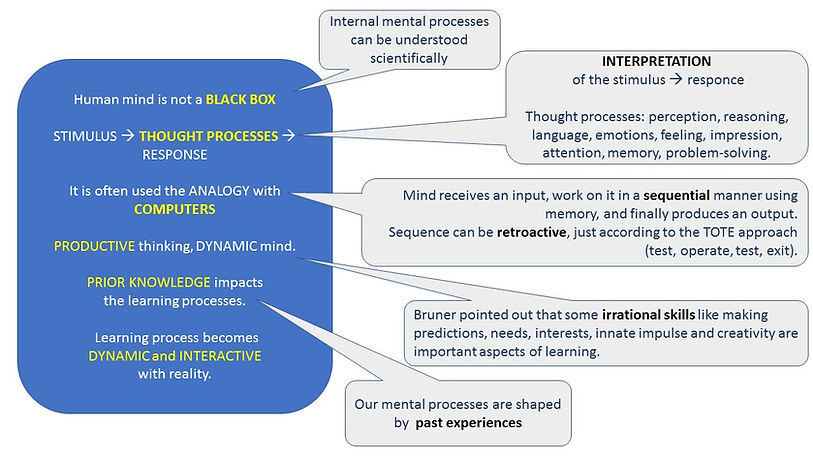
Instructional Design and Technology
edX - UMUC University of Maryland University College
Oct- Dec 2017
Cognitivism

Social Cognitivism


The discovery of mirror neurons has lent biological support to the theory of social learning.
Connectivism
Cognitivism and Connectivism
They rely on a common view of learning as a dynamic and interactive process.
As social cognitivism, connectivism take place interpersonally, in a digital reality that has became equally important and miningful as "reality" most prominently said.
Specific to Connectivism:
-
learning can belong to non-human applications.
-
learning rely on difference of opinions.
-
learning has become by far more accessible: resources can be found in "material" network and also in virtual network. So there are more resourses.
-
Virtual network goes far beyond geographic network usually accessible by learners.
-
Knowledge itself is rapidly changing.
My personal examples
My High School learning experience.
As long as I proceed in my studies on learning theories I can find more and more aspects in this experience - one of my favourite indeed - that before I was not able to recognize.
As already said "she (my teacher) wanted us to develop our own critical thinking. She was giving us hints to let us make our own path, in order to freely experiment our analysis capabilities and develop our own point of view".
While reading the above words I wrote in describing my experiece in my Constructivism page, I now realize that my teacher's method was probably meant to enphasize our cognitive capabilities, not just the simplest (knowing and understanding) but also the most complex like analysis, syntesys and then the capability to mature our own judgement.
Learning Experience at Work.
During the Integration Project described in my page, I utilized nowadays technologies like videoconference, webinars, and screen sharing tools. The availability of this technology highly influenced the speed, the quality, and finally the good outcome of the Project. Why? Bacause I could virtually meet with all required colleagues at once without moving from my office, thus granting a quick and smooth information sharing. Because I could immediately get effective assistance via remote by IT experts when I needed help. Basically because I could effectively build connections among all relelvant "nodes" (colleagues owners of the information) and produce a final output that could satisfy all involved stakeholders. This make me think that all these elements can be summed up under the Connectivism umbrella.
References:
- Albert Bandura. (n.d.). Retrieved from Wikipedia: https://it.wikipedia.org/wiki/Albert_Bandura
- Apprendimento sociale, connettivismo e gamification. (n.d.). Retrieved from The Gamification Research Lab: http://www.gamification.it/gamification/apprendimento-sociale-connettivismo-e-gamification/
- Cognitive load theory. (n.d.). Retrieved from Mind tools: https://www.mindtools.com/pages/article/cognitive-load-theory.htm- McLeod, S. (2016). Bandura - Social Learning Theory. Retrieved from Symply Psycology: https://www.simplypsychology.org/bandura.html
- Connettivismo (teoria dell'apprendimento). (n.d.). Retrieved from Wikipedia: https://it.wikipedia.org/wiki/Connettivismo_(teoria_dell%27apprendimento)
- Guyan, M. (2013, November 1). 5 Ways To Reduce Cognitive Load In eLearning. Retrieved from eLeaning Industry: https://elearningindustry.com/5-ways-to-reduce-cognitive-load-in-elearning
- Jerome Bruner. (n.d.). Retrieved from Wikipedia: https://it.wikipedia.org/wiki/Jerome_Bruner
- Marconato, G. (2010, August 15). Perversioni di ferragosto: riflessioni sul connettivismo. Apprendere sempre. Retrieved from:
http://www.giannimarconato.it/2010/08/perversioni-di-ferragostoriflessioni-sul-connettivismo/
- Pappas, C. (2016, April 16). 7 Tips To Reduce Cognitive Overload In eLearning. Retrieved from eLleaning Industry: https://elearningindustry.com/7-tips-reduce-cognitive-overload-elearning
- Psicologia cognitiva. (n.d.). Retrieved from Wikipedia: https://it.wikipedia.org/wiki/Psicologia_cognitiva
- Smith, M.K. (2002). Jerome S. Bruner and the process of education, the encyclopedia of informal education. Retrieved from: http://infed.org/mobi/jerome-bruner-and-the-process-of-education/
- Social cognitivism. (n.d.). Retrieved from edX Instructional Design and Technology: Learning Theories:
Cognitive load theory
It was developed by John Sweller (1988). Cognitive load" relates to the amount of information that working memory can hold at one time. Sweller said that, since working memory has a limited capacity, instructional methods should avoid overloading it with additional activities that don't directly contribute to learning.
Working memory can be extended in two ways:
-
combining both visual and auditory information (modality effect).
-
drawing upon existing knowledge.
Cognitive Load Theory helps design training that reduces the load on working memory:
-
Measure Expertise and Adapt Presentation Accordingly.
-
Reduce the Problem Space by breaking the concepts into parts.
-
Reduce Split-Attention Effect by integrating visual information.
-
Take Advantage of Auditory and Visual Channels in Working Memory.